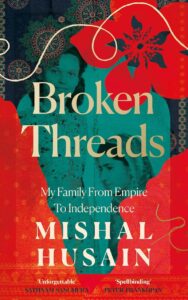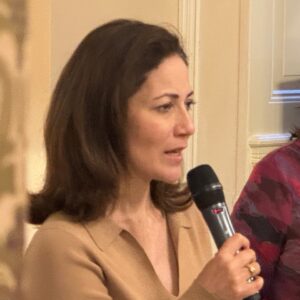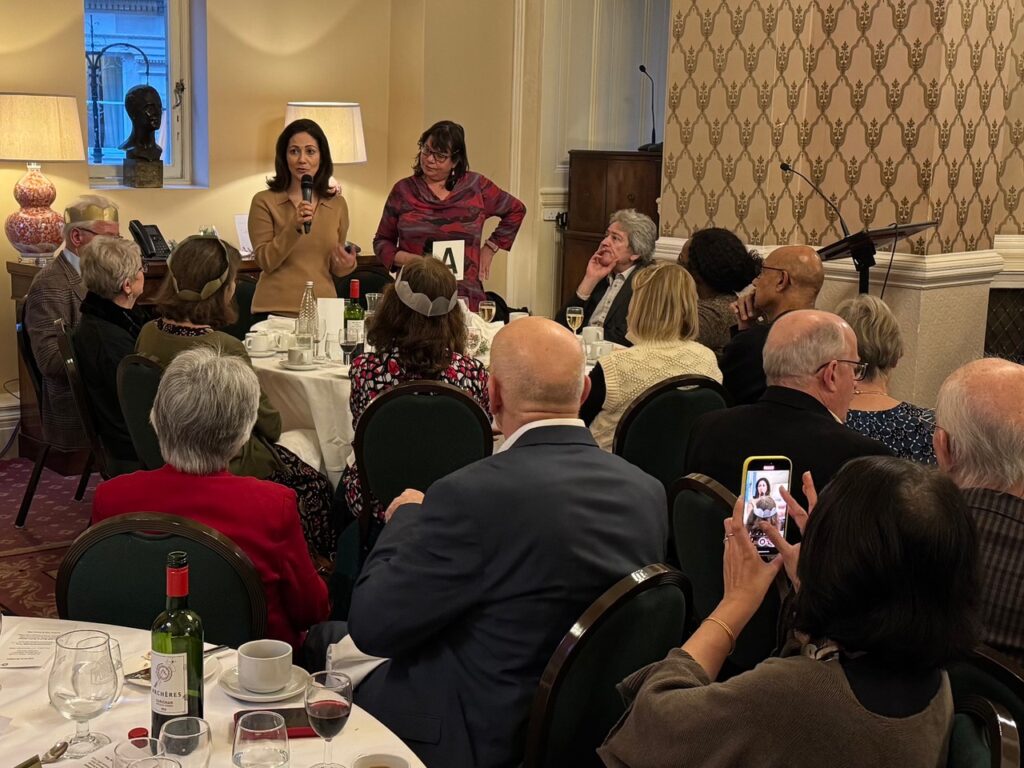Five minutes into the Authors Club lunch on December 12, an elderly man sidled over to the top table and stood like a nervous waiter behind the guest speaker, Mishal Husain. On receiving an encouraging raised eyebrow, he handed her a piece of paper showing his name. “Can I ask,” he said, “are we related?” Ms Husain gave him a sweet smile. “I don’t think so,” she said. “You have one S too many.” Mr Hussein returned to his seat looking far from unhappy. He’d failed to establish a blood relation with her, but at least he’d managed a tiny chat with the Muslim goddess of British broadcasting.
The Club Chair Lucy Popescu reminded the jam-packed audience in the Lady Violet Room that Mishal’s career outside the BBC “has taken her from Davos to Rohingya refugee camps and from interviewing prime ministers to Prince Harry and Meghan Markle.”
Her new book, Broken Threads, explores the lives of her four grandparents, Tahirah, Shahid, Mumtaz and Mary. “They didn’t think they were very special,” she said, “but they were born under the Raj and saw seismic changes that affected them in every way. You can’t understand them without knowing the historic events they lived through.”
The event that sparked her research was a wedding gift from a great-aunt: a shawl whose border was some fabric from a sari she had worn in younger days – a touching connection to the family’s past.
 Her grandmother Mary was a Catholic from the south-east of India, whose husband Mumtaz was a Muslim from the province of Punjab. Their marriage could have been problematic but “it worked,” said Mishal, “because she had a deep faith and so did he.” Her mother Shama’s parents were more stable when it came to belief. Both Shahid and Tahirah were Muslims. Tahirah helpfully left an audio-taped record of their lives, but it left out a great deal. The family was part of the great migration that followed Partition, but the tapes offered no record of any conversation about where the family might go in Pakistan. “They didn’t think it was as big a deal as it turned out,” said Mishal coolly.
Her grandmother Mary was a Catholic from the south-east of India, whose husband Mumtaz was a Muslim from the province of Punjab. Their marriage could have been problematic but “it worked,” said Mishal, “because she had a deep faith and so did he.” Her mother Shama’s parents were more stable when it came to belief. Both Shahid and Tahirah were Muslims. Tahirah helpfully left an audio-taped record of their lives, but it left out a great deal. The family was part of the great migration that followed Partition, but the tapes offered no record of any conversation about where the family might go in Pakistan. “They didn’t think it was as big a deal as it turned out,” said Mishal coolly.
Grandfather Mumtaz left behind a memoir, usefully explaining what life was like in purdah – how his mother was obliged to wear the veil in public streets. Mishal was evidently happy to discover the presence, in her family tree, of an Irishman – Mary’s father, Francis Quinn. He was born in India,and fathered two children with Mary’s mother. Local Catholic nuns persuaded him to do the decent thing and marry her, after which he bought land for a farm and, in his 50s, fathered more children and died, relatively young, following an accident. Lucy Popescu wondered how Mishal saw her identity when growing up. “One of my cousins, living in Islamabad, sent me his passport from 1931,” she said, “which described him as a ‘British subject by birth’,” she said. “So I think of myself as the daughter of an immigrant, but the granddaughter of a British subject – part of the Empire, like the Windrush generation.”
 Among the questions that followed this vivid and absorbing talk, one asked where Mishal Husain saw the powerful British men who oversaw the Partition of India: Claude Auchinleck (Supreme Commander of British forces in India) and Lord Mountbatten (Viceroy and Governor- General of India). How did she rate them in importance?
Among the questions that followed this vivid and absorbing talk, one asked where Mishal Husain saw the powerful British men who oversaw the Partition of India: Claude Auchinleck (Supreme Commander of British forces in India) and Lord Mountbatten (Viceroy and Governor- General of India). How did she rate them in importance?
“You mean, speaking as an impartial BBC journalist?” said Mishal, nimbly sidestepping a straight answer. “Auchinleck didn’t think Mountbatten was going about things the right way. India was a very mixed and complex society which he didn’t know about then. And my grandfather saw Mountbatten at close quarters and didn’t like him.”
At the end, a young woman with ambitions as a memoirist enquired: “Where would you start writing a memoir if you didn’t have the resources you had?” Mishal’s answer was admirably practical. “You can start with the place where the family lived, check out at the census, see what economic activity was around, and the lives of others in the same place. Look for connections: the family friend or distant cousin you could email for information, and people they can suggest for further contact.” The questioner beamed at this advice from an expert in the unearthing of family secrets.
John Walsh

